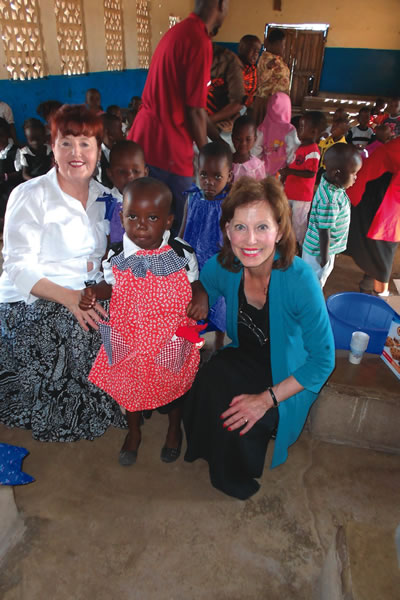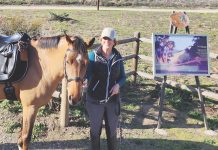Mary Ellen Carter
Laguna Beach resident Mary Ellen Carter expresses her passion for educating impoverished children through her nonprofit, Direct Connections to Africa. – By Ashley Breeding
 Five years ago, Mary Ellen Carter accompanied her husband, federal judge David Carter, to Malawi, Africa, where he was involved with judicial education. The Laguna Beach resident had learned of the country’s extreme poverty—it’s one of the four poorest in the world—so she intended to donate some medical and educational supplies to the schools during her visit. However, deeply inspired by the stories of the children she encountered in Malawi and compelled to contribute more, what began as a simple, kind gesture developed into a full-time dedication to the cause. Upon returning to the U.S., Mary Ellen founded Direct Connections to Africa (DCTA), a nonprofit whose mission is to enhance educational opportunities in Malawi (dctafrica.net). We sat down with Mary Ellen to learn about how her organization has grown and is bettering the lives of the village’s children every day.
Five years ago, Mary Ellen Carter accompanied her husband, federal judge David Carter, to Malawi, Africa, where he was involved with judicial education. The Laguna Beach resident had learned of the country’s extreme poverty—it’s one of the four poorest in the world—so she intended to donate some medical and educational supplies to the schools during her visit. However, deeply inspired by the stories of the children she encountered in Malawi and compelled to contribute more, what began as a simple, kind gesture developed into a full-time dedication to the cause. Upon returning to the U.S., Mary Ellen founded Direct Connections to Africa (DCTA), a nonprofit whose mission is to enhance educational opportunities in Malawi (dctafrica.net). We sat down with Mary Ellen to learn about how her organization has grown and is bettering the lives of the village’s children every day.
LBM: At what moment did you realize that you wanted to “do more”?
MEC: While I was in Malawi, I spent a few hours with Sarah, one of the village grade-school teachers. I was overwhelmed by the poverty and amazed to learn that simple supplies that we take for granted are such an enormous gift for these children—even pencils are so scarce that students usually break them in half and share them. Through my ongoing correspondence with Sarah, I learned that my donation had attracted new students to the school—these small gifts could make the difference between students staying in school or dropping out—which inspired me to keep giving.
LBM: What does Direct Connections to Africa provide for these children?
MEC: To start, we provided villages with educational supplies [and] scholarships that enable children to continue elementary and secondary education, create and foster recreational programs, promote job development, and help to meet medical needs by directly connecting an individual from the village with a member of our own community. Most recently, we built an educational center in a remote area of the Mangochi district (completed in April) because they had nothing like this for classes or a central meeting place. We’re now working on a second educational center that was needed in a more central location. The centers educate people from preschool through adulthood.
LBM: What do your health clinics provide?
MEC: Health care in Malawi is nearly nonexistent. Through our clinics, we have volunteers who share extensive HIV education throughout the region, and also offer mother and baby classes, which extend needed advice that was previously unavailable.
LBM: How does DCTA acquire funds for these projects?
MEC: We are dependent on donations. We’ve raised money through fundraising events (with the help of more than 60 volunteers) and through our Sponsor a Child program in which donors can support a child. The Griswold Foundation granted us $70,000 to buy land, irrigate it and build the second educational center. They’ve just provided another $28,000, which will supply a basketball court, soccer field with bleachers, a volleyball court, furnishings for the building and toilets.
LBM: How does the Sponsor a Child program work?
MEC: Through the program, donors support a child—or children—for $300 a year, which helps pay for school tuition and exam fees. If they so choose, they can correspond with their child to learn how their donations are positively impacting lives in Malawi.
LBM: What have you learned through your experience with the children in Malawi?
MEC: I think anyone who experiences these Third World cultures appreciates everything we have taken for granted and realizes that [many] things we all thought we had to have are not really important. The children teach you to persevere when you are down and things get tough. Knowing the things they have to live through makes our struggles not as big. They have also taught me patience—these cultures do not have the communication or transportation that we do—everything moves very slowly.
LBM: You recently had one of your students in Malawi visit Laguna; what was the purpose of the visit?
MEC: Tasmim, a 25-year-old student who I met during one of my first trips to Malawi, was allowed to visit the U.S. for three weeks to talk about how we have helped her and bring awareness about the needs of her country. She also got a chance to visit many of our sites—Las Vegas to see the hotels, Disneyland, SeaWorld, the Laguna Playhouse, a UCLA football game, an IMAX film and much more. She was overwhelmed by everything. … It expanded her world. Malawi has an international university for hotel management where they train students to work in other countries. Since her travels to America, she is looking into this.
LBM: Many people in the U.S. protest this kind of foreign aid when we have so many issues on our own soil—what do you say to those people?
MEC: My view is that when a government can’t support its own people, it’s our job to step in—without hope, these children have nothing. LBM




